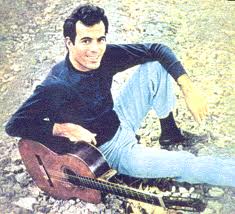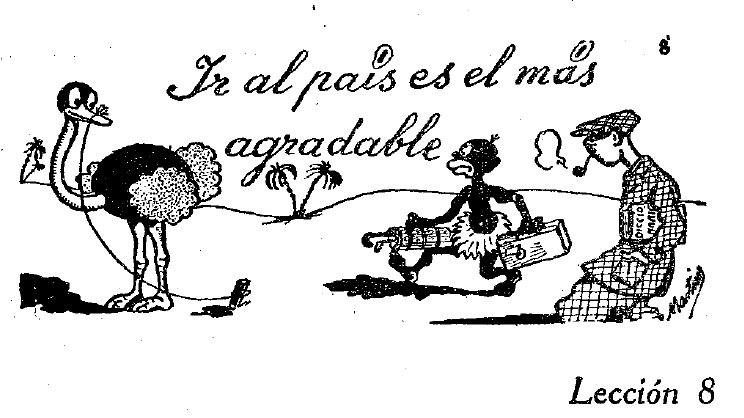
| Языки :: Испанский |
| Аудио |

 |
|
 |
|
|
Español |
Spanish |
| Lección Octava (8ͣ) | ||
| Iremos a España | (We) shall go to Spain. | |
| 1 | Hay diversos medios para aprender una lengua (1). | There are divers means for Iearn(ing) a language. |
| 2 |
Se pueden tomar lecciones en una escuela, o con un profesor, o por correspondencia (2). |
One can take lessons in a school, or with a teacher, or by correspondence. |
| 3 | Se puede estudiar con un libro para aprender solo, sin profesor (3). | One can study with a book to learn alone, without (a) teacher. |
| 4 |
También se pueden emplear discos, estudiando con más placer y menos esfuerzo (4). |
One can also use [employ] records, studying with more pleasure and less effort. |
| 5 |
Pero de todos los medios, ir al país es el más agradable y el más práctico... |
But of all [the] means, to go to (the) country is the most agreeable and the most convenient. |
| 6 | ¡Claro! Usted habla como un libro; | Of course, you (your H.) speak like a book; |
| 7 |
¿cómo puedo yo ir a España para aprender
el español? Me falta tiempo, me falta dinero... |
How can I go to Spain to learn [the] Spanish? I lack time, I lack money [time fails me...]. |
| 8 |
No se preocupe usted, amigo mío; mañana mismo iremos a España... sin necesitar tiempo ni dinero. |
Do not be preoccupied, my friend [friend my]; even to-morrow [to-m. even] (we) shall go to Spain... without needing time nor money. |
| EXERCISE : | ||
| 1 |
Mañana iré a la estación; Carlos irá también; iremos todos. |
To-morrow (I) shall go to the station; Charles will go too; (we) shall all go. |
| 2 | ¿Ha visto usted mi libro de español? | Have you [Has your H.] seen my book of Spanish? |
| 3 | Sí; es mas practico que el mío. | Yes (it) is more convenient than [the] mine. |
| 4 | ¿Puede usted prestar dos o tres discos al amigo Pedro? | Can you lend two or three records to [the] friend Pedro? |
| 5 | Dispense, no puedo; no presto mis (pron. meess) discos. | Excuse (me, I) can't; (I do) not lend my records. |
| 6 | Es usted muy libre. (pron. leebry). | You are quite free [is your H. q. f.]. |
| NOTES. | |
| 1 |
To, in order to is para and not por.
As you will see in the next sentence, por also means by. |
| 2 |
Lección loses its accent in the plural; owing to the addition of
a syllable ending in s, it needs it no longer, the stress being then normally on the last but one. We put a fat o only because it dominates in the diphthong io. |
| 3 |
Se puede is the usual phrase for one can; |
| 4 |
Z is always sounded like the Spanish ci or
ce, i. e., like the English hard th (S. 3rd lesson). |
|
Without yet trying to learn the conjugation of verbs, let us examine
them (distrustfully as if they were unknown insects). We see three kinds : tomar, to take; aprender, to learn; servir, to serve. They are the three conjugations : infinitives in ar, er, ir. |
|
|
The 1st person in the present always ends in o; |
